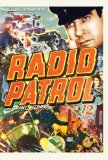| Reviews & Columns |
|
Reviews DVD TV on DVD Blu-ray 4K UHD International DVDs In Theaters Reviews by Studio Video Games Features Collector Series DVDs Easter Egg Database Interviews DVD Talk Radio Feature Articles Columns Anime Talk DVD Savant Horror DVDs The M.O.D. Squad Art House HD Talk Silent DVD
|
DVD Talk Forum |
|
|
| Resources |
|
DVD Price Search Customer Service #'s RCE Info Links |
|
Columns
|
|
|
Radio Patrol
VCI, which really should be commended for releasing little-seen and obscure titles from Hollywood's "B" history (I'm enjoying their second Darn Good Westerns volume, which I'll be reviewing soon), has released another smasheroo chapter play, 1937's Radio Patrol, the 12-chapter matinee serial from Universal starring Grant Withers and Katherine Hughes, based on the King Features comic strip of the same name. While not as elaborate a DVD set as their recent Green Hornet release (no extras other than a trailer, less-than-optimal film elements), Radio Patrol gets the job done for chapter play enthusiasts.
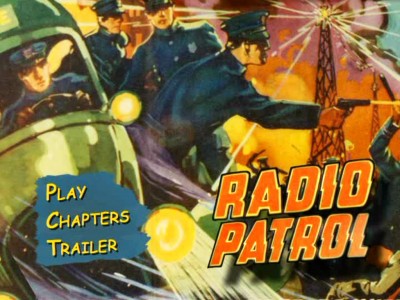
I'm certainly no expert on either serials or early 20th century newspaper strips, so I had to do a little digging to get background info on Radio Patrol (if any experts out there find I've jumbled something up, please feel free to email me). Universal, no doubt impressed with the overwhelming success the year before with their comic strip-to-screen chapter play adaptation of Flash Gordon, took inspiration for this 1937 serial from another popular same-named strip, Radio Patrol. Apparently, the Radio Patrol strip was personally commissioned in 1933 by William Randolph Hearst for his King Features Syndicate, in response to rival syndicate Dick Tracy's success. Artist Charles Schmidt and writer Eddie Sullivan were assigned the job of creating a realistic urban police actioner for The Boston Record newspaper, as a try-out for later syndication. Schmidt and Sullivan came up with Pinkerton, Jr., which focused on a boy named Pinky, with a supporting character, uniformed police officer Pat O'Hara, quickly taking the strip's lead as Pinky was eventually "aged" for the strip. Other characters included Pat's partner, Sam, and policewoman Molly Day (Molly shows up in the serial here, but she's not a cop). Renamed Radio Patrol for King Features when the strip was syndicated in 1934 (it would again be retitled Sgt. Pat of the Radio Patrol), it ran for the next 16 years in the dailies, while its Sunday strip ended in 1946.
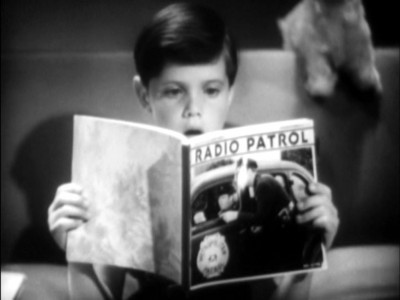
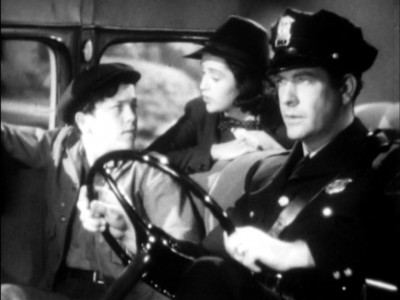
A brief outline of some of Radio Patrol's action is in order, but don't worry - I won't give away too many cliffhangers. A rash of armed robberies have caught the Metropolitan police force at a disadvantage: they show up at the scene of the crime well after the criminals have made a safe getaway. It's decided that a special "Radio Patrol" unit shall be set up, with prowl cars equipped with two-way radios covering the city 24 hours a day. Radio Patrol officers Pat O'Hara (Grant Withers) and his crossword puzzle-obsessed partner, Sam Maloney (Adrian Morris) happen to be cruising one of the city's hot spots -- the dump - when they spot a lad from their old beat, young teen whiz kid, Pinky Adams (Mickey Rentschler), and his wonder dog, Irish (Silver Wolf the German Shepherd). Apparently, Pinky's inventor father, John P. Adams (Harry Davenport), had to use all his money to finalize his latest experiment -- hence, the move to less amenable accommodations run by old coot, Jeremiah Crockett (Earl Dwire). That experiment, though -- flexible steel -- could revolutionize the world (particularly in its military applications), bringing countless millions to John and his son, Pinkie, and John intends to demonstrate this miracle invention at Mr. Wellington's (C. Montague Shaw) iron and steel works. Before he can successfully demonstrate the material, however, he's killed by a hidden assassin, and the chase is on for his flexible steel formula. Interested partners and would-be suspects include W. H. Harrison (Gordon Hart), a rival steel magnate and a nasty s.o.b. who believes the formula belongs to him; Harry Selkirk (Max Hoffman, Jr.), a former employee of Harrison's who was unfairly sacked by the magnate; and Harry's sister, Molly (Catherine Hughes), who still works for Harrison, and who proves to be a tough little scrapper herself during the chase for the formula. And while we're naming names, what does the mysterious Mr. Tahata (Frank Lackteen) have to do with this international game of industrial espionage and murder? Could his use of hypnosis be a factor in Adams' killing?
CLIFFHANGER SPOILERS ALERT!
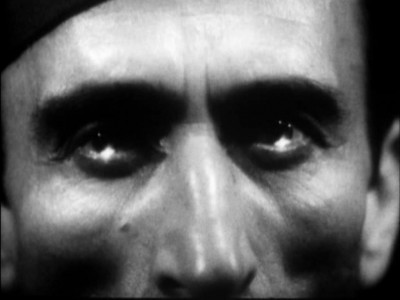
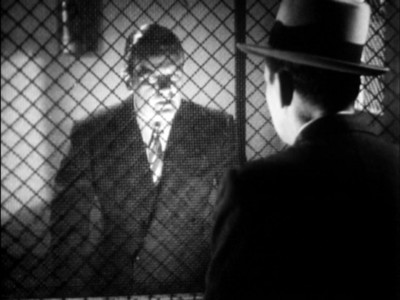
I'm not sure if I had even heard of the strip, Radio Patrol before, let alone this 1937 serial, so the characters and situations were all new to me - something that would not have been the case for the millions of kids who went to see this serial at Saturday matinees all over the country. As I wrote above, I don't have any specialized knowledge of serials, but I've seen most of the major ones (Superman, Gang Busters, Captain Marvel, Spy Smasher, Captain America, among others), and I grew up on seemingly endless Saturday night repeats of Buster Crabbe's Flash Gordon on Detroit's Channel 50 (right after The Honeymooners, and right before The Ghoul's movie program). I don't judge serials as a whole by the standards of other movie genres because their rigid economics and rapid methods of production usually played more of a role in how these installments shaped up on the screen, as opposed to considerations of direction, scripting and performing. Part of the charm of these old serials are the production mistakes that crop up, such as the endlessly recycled shots of that police car going around the same street corner here, as well as the sometimes incomprehensible bits of business that seem even more baffling and delightful today (one of the best -- and silliest -- elements of Radio Patrol's production design are the frequent forays into the city's "Egyptian quarter," which looks more like a foreign country, complete with sandy streets and mocked-up faux-Moroccan architecture...supposedly in the middle of an urban American city). But more importantly, I actively enjoy the format (after all, this structure has been recycled endlessly in modern action films, with its greatest success, arguably, in its adaptation to the Bond thrillers). I like a good cliffhanger, and as anyone who's read my reviews on vintage TV and "B" movies can tell, I respect "old-fashioned" entertainment for entertainment's sake (it sure beats the hell out of most stuff on TV and in the movie theaters today).
And Radio Patrol, simply put, is entertaining. It's not the best serial I've seen, either in action or story (or direction or performance, for that matter, either), but it's serviceable, with a snappy pace by directors Ford Beebe and Cliff Smith (who died right after this was filmed), plenty of villains to go around, a stalwart hero, and some agreeably outsized cliffhangers. From the first two cliffhangers, the chapter play held my interest, with Pat seemingly ready for both an unconscious dip into a steel furnace and (best of the lot) a huge crushing plate/clamp that comes down to squish him against a door. Most of the cliffhanger conventions of the typical serial are met here (Molly goes over a cliff in a car, Pat is caught a couple of times in a burning building, as well as almost getting blown up a few times), while a few other touches give Radio Patrol a bit of a boost. I'm sure all those kids in the matinees thought it was swell that Pat treated Pinky like a junior officer, even letting him take over the driving of a police car in hot pursuit (!) as Pat jumps out to chase a fleeing villain. As well, those young audience members would have probably killed to have a smart pup like Irish (Irish gets a few action scenes of his own, including a spectacular jump from a cliff - another cliffhanger staple - as well a few chances to tear a henchman apart with his sharp fangs). If Frank Lackteen didn't inspire too much dread as the mysterious Tahata (he's really quite bad here, with line deliveries that lack not only any feeling, but simple amplification), his character's power to hypnotize his henchman added a nice supernatural element to the more realistic industrial spies plot. And I particularly liked Adrian Morris as the comedic sidekick, Officer Sam. A dead-ringer at certain angles for rotund comedian John Candy when he essayed his unforgettable character, Johnny La Rue, Morris goes right along with the screenwriters' seemingly deliberately spoofy treatment of his character, which strangely plays quite modern today, seen in that context. Constantly working on crossword puzzles when he supposed to be on lookout, you can just tell that Morris knew this was all a goof, and he was going to act accordingly. It's a surprisingly contemporary element to the serial, and a welcome one (during a high-speed chase, oblivious Sam, his face buried in a newspaper, asks Pat, "What's a four-letter word for 'stupid'?" to which Pat sneers and answers, "Try 'dumb'.").
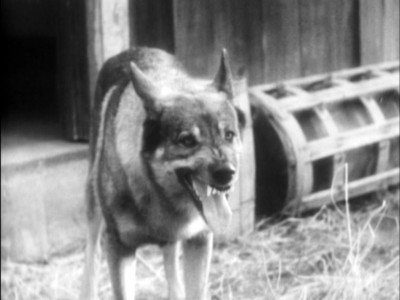
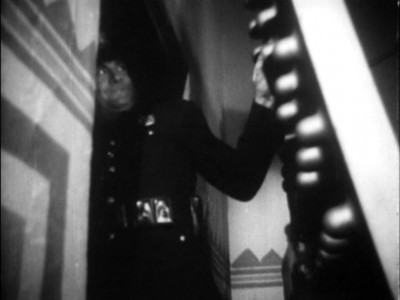
The DVD
The Video
As I wrote before, I haven't had extensive experience with these older serials on DVD, so I don't know what the "norm" is for presentation, but I found the full-screen, 1.33:1 black & white transfer here for Radio Patrol about what I expected. The disc case says the film elements have been "digitally restored to its present condition" (that could mean anything, really), but that aside, the film elements used here present a fair image. At times too contrasty or too dark, clarity is sometimes lost with a soft picture, not helped by the interlacing from the transfer (it was almost impossible to grab screen caps here without blur). Still, overall, an average presentation for a film of this type, with the expected scratches and dirt present, as well.
The Audio
The Dolby Digital English mono audio track suffers, I would assume, from the original elements used here, which can fluctuate quite broadly with its loudness levels. Squelchiness and warble are also problems as often as not. Hiss is noticeable.
The Extras
The only extra included for Radio Patrol is the original theatrical trailer for the serial.
Final Thoughts
Fast-moving as a serial should be, Radio Patrol may not rank as one of the best of Universal's 30s serials, but most of the cliffhangers are tightly executed, the story has enough twists and turns to keep your interest, and the performances, for the most part, are more than adequate for this genre (Adrian Morris is quite funny here). For serial fans, I recommend Radio Patrol.
Paul Mavis is an internationally published film and television historian, a member of the Online Film Critics Society, and the author of The Espionage Filmography.


|
| Popular Reviews |
| Sponsored Links |
|
|
| Sponsored Links |
|
|
| Release List | Reviews | Shop | Newsletter | Forum | DVD Giveaways | Blu-Ray | Advertise |
|
Copyright 2024 DVDTalk.com All Rights Reserved. Legal Info, Privacy Policy, Terms of Use,
Manage Preferences,
Your Privacy Choices | |||||||









